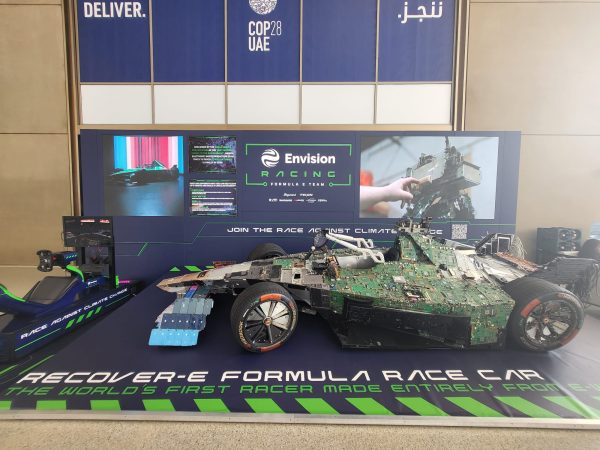
Picture credit Deepa Senapathi: Formula E at COP28
Written by PhD student Lynn de Miranda from FoodBioSystems DTP
The topic of renewable powered transport is a fast moving one. However, the drive of the general public to change to electric vehicles (EVs) has been slow.
Although the amount of EVs on the world’s roads sits at around 26 million, this only accounts for about 17% of the world’s vehicles (1). Of these more than half are located in China. One of the limiting factors to EV growth has been the perception of the general public, who still regard them as inconvenient to charge, slow to drive and expensive to buy.
Eco-tech in the spot light
Formula E, an all-electric motorsport championship has been focussing on changing the public’s opinion of EVs. During COP28 they spoke about their newest generation of cars and how these harness the most powerful electric engines available.
Gen 3 cars are able to convert 90% of their electrical energy into motion, compared to the 40% seen in standard combustion engine cars. This results in a top speed of 322 km/h, a speed that challenges most super cars (2).
The batteries themselves are also revolutionary. After the race season some of the batteries are reused in show cars for Formula E and McLaren. While thanks to a collaboration with Umicore, the remaining batteries can be broken down and minerals and components recycled (3).
‘’From the resulting metal alloys we produce best-in-class cathode materials which are then supplied to our customers for use in new rechargeable batteries or other products’’ states the Umicore website (4).
The impressive top speed and battery are not the only things that set these new Gen 3 cars apart. The new cars harness the ability of truly ultra-fast charging. These cars are able to accept a charge of 600kW, almost double the power of most advanced chargers. The FIA, the governing body of Formula E, hope that this fast charging could be used to recharge the cars mid race, adding to excitement comparable to pit-stops in conventional motor sports.
“The combination of sporting enhancements, a step change in car performance, cutting-edge battery technology and the innovation of Attack Charge will make our racing more competitive and entertaining while showcasing the future for EV development’’ said the CEO of Formula E, Jamie Reigle.
Inspiring the public
Formula E, as well as other electric racing series such as E-extreme, are also highlighting sustainability issues faced by, not only motor sports, but the general public.
Earlier this year, one of the Formula E teams, Envision, launched a fully drivable Gen 3 car that is completely made from electronic waste products. Phones, disposable vapes and other electronic products amount to a staggering 50 million tons of waste every year (5). This car was launched in London, to highlight the fact that the UK is the second largest producer of electronic waste.
At COP28, Envision launched an expansion of their campaign ‘’Race against climate change’’. This expansion sees the incorporation of the iconic ‘’Climate Stripes’’ by University of Reading professor Ed Hawkins, on the car livery and team uniforms. The ‘’Climate Stripes’’ are a collection of coloured stripes that represent the average temperature per year and have served as a emblem for climate change.
‘’The race against climate change ‘’campaign, first announced at COP26, allows fans to make personal commitments to reduce their carbon impact. Since 2021, there have been over 250,000 pledges made by fans (6).
“I’m thrilled to partner with Envision Racing, and together, we will engage new audiences in conversations about climate change and the urgent need for collective action’’ said Prof. Hawkins.
Another partnership that focusses on sustainability is that with the logistic company DHL. Formula E and DHL have worked together to create a racing calendar that allows for the prioritization of slower sea and rail freight. In addition they are committed to running all sea and road freight on bio-fuels (7).
“Our years of partnership have been thrilling so far, working together to promote sustainability around the world. We look forward to continuing the green journey together.” said Arjan Sissing, Head of Global Brand Marketing at DHL.
With its core ideology based on demonstrating that motorsports don’t have to impact our climate to be exciting, Formula E continues to be a champion of sustainability.
Sources
- https://www.iea.org/reports/global-ev-outlook-2023/trends-in-electric-light-duty-vehicles
- https://www.fiaformulae.com/en/news/2439/gen3-facts-performance-x-efficiency-x-sustainability
- https://www.umicore.com/en/cases/formula-e/
- https://www.fiaformulae.com/en/news/6220/insight-the-formula-e-car
- (1) https://www.theworldcounts.com/challenges/planet-earth/waste/electronic-waste-facts
- https://envision-racing.com/race-against-climate-change/
- https://www.dhl.com/global-en/home/press/press-archive/2023/formula-e-and-dhl-renew-partnership-kicking-off-the-new-gen3-era.html

